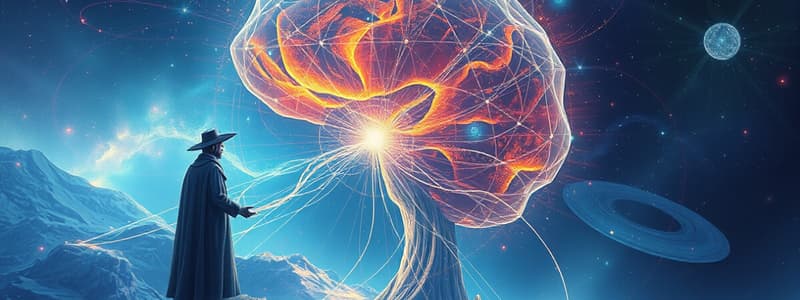Podcast
Questions and Answers
What is memory?
What is memory?
Learning that has persisted over time, through the storage and retrieval of information.
How do psychologists describe the human memory system?
How do psychologists describe the human memory system?
Psychologists use memory models involving encoding, storage, and retrieval.
What is the difference between explicit and implicit memory?
What is the difference between explicit and implicit memory?
Explicit memory requires conscious effort, while implicit memory occurs automatically.
What information do we automatically process?
What information do we automatically process?
How does sensory memory work?
How does sensory memory work?
What is the capacity of our short-term and working memory?
What is the capacity of our short-term and working memory?
What are some effortful processing strategies that can help us remember new information?
What are some effortful processing strategies that can help us remember new information?
What are the levels of processing, and how do they affect encoding?
What are the levels of processing, and how do they affect encoding?
What is the capacity of long-term memory?
What is the capacity of long-term memory?
What are the roles of the frontal lobes and hippocampus in memory processing?
What are the roles of the frontal lobes and hippocampus in memory processing?
What roles do the cerebellum and basal ganglia play in our memory processing?
What roles do the cerebellum and basal ganglia play in our memory processing?
How do emotions affect our memory processing?
How do emotions affect our memory processing?
How do changes at the synapse level affect our memory processing?
How do changes at the synapse level affect our memory processing?
Flashcards are hidden until you start studying
Study Notes
Memory
- Memory is defined as learning that persists over time, involving the storage and retrieval of information.
Human Memory System
- Psychologists utilize memory models to analyze the memory system, including information-processing models.
- Key processes in these models include encoding, storage, and retrieval.
- The connectionism model regards memories as interconnected neural networks.
- Atkinson-Shiffrin model stages include sensory memory, short-term memory, and long-term memory.
- Updated models introduce working memory for active processing and automatic processing for unconscious information handling.
Explicit vs. Implicit Memory
- The brain processes information through parallel processing, managing multiple inputs simultaneously.
- Explicit (declarative) memories require conscious effort and attention, formed through effortful processing.
- Implicit (nondeclarative) memories, such as skills and conditioned associations, occur with automatic processing.
Automatic Processing
- The brain automatically processes incidental information about space, time, and frequency alongside skills and associations.
Sensory Memory
- Sensory memory provides initial information to working memory for active processing.
- Iconic memory is a brief visual sensory memory (a few tenths of a second), while echoic memory relates to auditory stimuli lasting three to four seconds.
Short-term and Working Memory Capacity
- Short-term memory can hold about seven items (± two) but loses this information rapidly without rehearsal.
- Working memory capacity varies based on factors like age and intelligence.
Effortful Processing Strategies
- Effective strategies for memory retention include chunking, mnemonics, hierarchies, and distributed practice sessions.
- The testing effect demonstrates that actively retrieving information enhances memory better than rereading.
Levels of Processing
- Depth of processing impacts long-term retention; shallow processing encodes words based on structure and appearance.
- Deep processing involves encoding meaning and enhances memorization, especially when the material is personally relevant (self-reference effect).
Long-term Memory Capacity and Storage
- Long-term memory capacity is virtually unlimited.
- Memories are stored across various brain regions rather than in single locations.
Brain Structures in Memory Processing
- The frontal lobes and hippocampus are crucial for explicit memory formation, processing information from across the brain.
- The hippocampus temporarily holds information before relocating it for long-term storage.
Implicit Memory Formation
- The cerebellum and basal ganglia support implicit memory formation.
- The cerebellum aids in storing conditioned memories, while the basal ganglia assist in forming procedural memories related to motor skills.
Emotional Impact on Memory
- Emotional arousal elevates stress hormones, activating memory-forming areas of the brain.
- Significant stress can create vivid flashbulb memories.
Synaptic Changes and Memory
- Long-term potentiation (LTP) is essential for enhancing synaptic strength and is considered a neural basis for learning and memory processing.
Studying That Suits You
Use AI to generate personalized quizzes and flashcards to suit your learning preferences.




